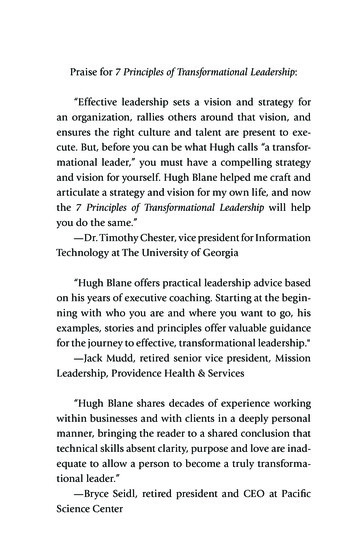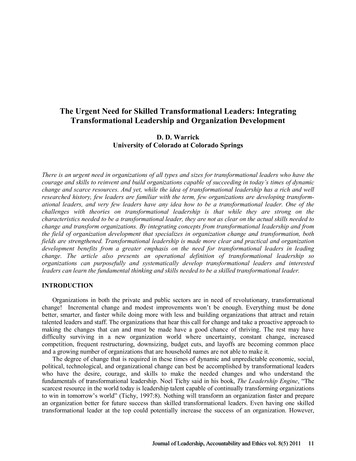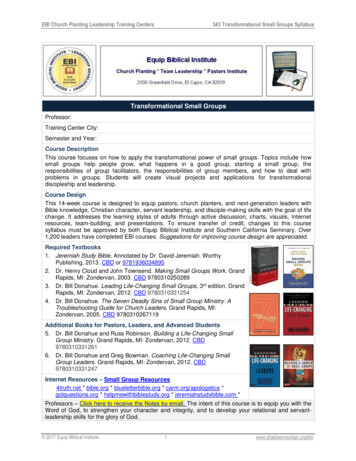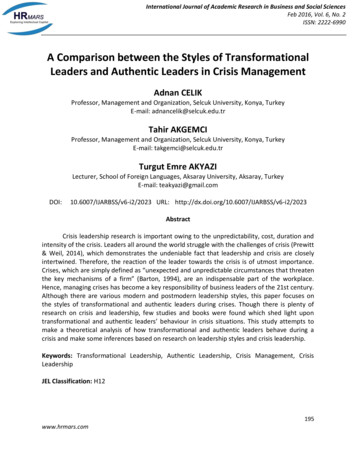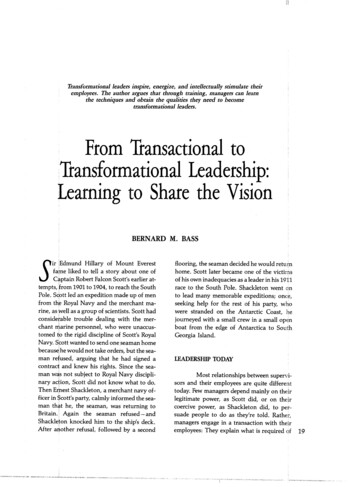
Transcription
TransformationalLeadershipMark R. Beauchamp, Ph.D.
Leaders and mentors change lives!
Peer Mentoring andDisabilities Motivation Hope Comfort/Acceptance Engagement RedefiningLimitations Self-confidence Overall Well-Being/Happiness Social Connections
Dilbert Definition of Leadership"Leadership is an intangible quality with no definition.That's probably a good thing, because if the people beingled knew the definition, they would hunt down their leadersand kill them."-Scott Adams
Differentiating Wonderful and Dreadful Leaders(and Peer Mentors) Dreadful leaders demean their followers Wonderful leaders elevate their followers"Recognize the smartest person in the roomrather than act like the smartest person in the room."-New York Times, February 26, 2006
Working Definition of LeadershipTo take people1 to places they would not have gone bythemselves, and get them to do things they otherwisewould not have done because[a] they want to do it[b] they understand why!1 Couldbe peer mentees, employees, athletes, students.
Purpose of SCI Peer Mentorship Fulfillingfamily roles and responsibilities (being a father, mother, spouse,etc.) Gettingout and about-going shopping, to concerts, to restaurants Returningto work Participatingin sports, exercise, leisure activities Travelling/touringabroad Dating,sexuality Gettingaround the community Usingpublic transit, taxis, etc Self-care(i.e. bowel and bladder routines, dressing) Housework, Parentinghousehold chores
TransformationalLeadershipActions that transcend one’s ownself-interests with the purpose ofempowering, inspiring, andchallenging others to achieve ahigher level of functioning. (Bass& Riggio, 2006)
TransformationalLeadership Leadershipis pivotal Consistentlypredictsemployee, student,athlete: attitudes motivation performance well-being
Four ‘I’s of Transformational LeadershipIdealized Influence (II) Engender trust and respect Demonstration of personally held valuesInspirational Motivation (IM) Communicating high expectations Inspiring and energizing others to go beyond minimal standardsIndividual Consideration (IC) Recognizing individual needs Genuine sense of care and concernIntellectual Stimulation (IS) Encouraging others to approach old problems in new ways Contribute new/alternative solutions
Hockey is Hockey
Full Range of Leadership
Feedback and Recognition"The key to developing people is to catch them doingsomething right."- Blanchard and Johnson,The One-Minute Manager
Full Range of Leadership Contingent Reward Constructive Immediatetransactionsand specific feedback Management-By-Exception Corrective Whentransactionsstandards aren’t met – has ‘active’ and ‘passive’forms Laissez Faire Non-leadership
Can We learn to be Transformational?
Bottom Line?
Lunch
Idealized Influence Behave as a role modelIdealized influence takes placewhen leaders foster trust andrespect among others, andmodel ethically desirablebehaviours through thedemonstration of personally heldbeliefs. Do what is right, not what isconvenient Create trust and respect Consistent and dependable And if you make a mistake don’t beafraid to APOLOGIZE!
Idealized Influence“You believe in something, you stand up forit, you try to pull together a team of peoplewho can be inspired by that same vision,and then help encourage people to addvalue by putting their unique talents to thetask - and you treat everybody with respect,no matter what role they’re playing.”- Rick Hansen
Idealized Influence:Strategies, Barriers, andSolutions? Identify potentialchallenges- “I don’t have time, tospeak with my mentee” Brainstorm possiblesolutions- Schedule it into yourcalendar, that way youensure that you allocatetime
Inspirational Motivation Raise expectationsInspirational motivation involvesthe communication of highexpectations, through whichleaders inspire and energizeothers to achieve their goals. Convince others that they canachieve ‘beyond expectations’ Be optimistic and enthusiasticabout what can be achieved Set high (but achievable) standards
Inspirational Motivation"You see, really and truly, apart from the thingsanyone can pick up (the dressing and theproper way of speaking, and so on), thedifference between a lady and a flower girl isnot how she behaves but how she is treated. Ishall always be a flower girl to ProfessorHiggins because he always treats me as aflower girl and always will; but I know I can be alady to you because you always treat me as alady and always will.” Eliza Doolittle
Inspirational Motivation:Strategies, Barriers, andSolutions? Identify potential challenges- “I’m finding it difficult tomotivate my mentee; s/heseems just sounenthusiastic” Brainstorm possiblesolutions- Give personal examplesof when you overcame achallenge, try and motivatethem, lead by example
InspirationalMotivation Tips1. Encourage mentees to leavetheir comfort zones and exploretheir abilitiesExample: As a mentor, be aware ofthe opportunities and eventsavailable to your mentee. This willenable you to provide your menteewith valuable information about allof the possible activities they canparticipate in.
InspirationalMotivation Tips2. Let mentees know you believein them.Example: Encourage your menteewhen they have doubts about theirabilities. Be enthusiastic and offerto accompany or assist them inthe activity they are findingdifficult or are nervous about (e.g.taking public transportation thefirst time).
InspirationalMotivation Tips3. Challenge mentees to setmeaningful and challenging goalsthat promote personal growth.Example: Be familiar with how tohelp your mentee set S.M.A.R.T.goals. Ensure that the goals aremeaningful and important to yourmentee, as this will help motivatethem.
Intellectual Stimulation Acknowledge your menteesdifficulties and challengesIntellectual stimulation involvesencouraging others to see issuesfrom multiple perspectives, andquestion their own and others’commonly held assumptions. Try to brainstorm potentialstrategies Discuss alternatives and challengeyour mentee
Intellectual Stimulation"Man's mind, stretched to a newidea, never goes back to its originaldimensions."Oliver Wendell Holmes
Intellectual Stimulation:Strategies, Barriers, andSolutions? Identify potential challenges- “My mentees say thatphysical/social activitiesaren’t for them, and theyjust can’t see the benefits” Brainstorm possiblesolutions- Provide them withscientific evidence thatshows its benefits
Individualized Consideration Listen, display empathy andIndividualized consideration takesplace when leaders respond tothe personal and psychologicalneeds of others, and display agenuine sense of care andconcern.compassion Recognize mentees’psychological and physicalneeds and abilities Display genuine care andconcern
IndividualizedConsideration"It was not just affability or goodmanners or his physicalappearance. But a genuine capacityfor empathy, for interesting himself inthe circumstances of other people."-Tom Lodge
Individualized Consideration:Potential Barriers, Challenges,and Solutions Identify potential challenges- “Given the limited time, money,and resources available to us it’simpossible to support mymentee to engage in activitiesthat s/he will really like” Brainstorm possible solutions- Get creative and think ofalternative activities that may bejust as enjoyable and benefitthem
IndividualizedConsideration Tips1. Treat each mentee as aunique, valued individual.Example: Thank your mentee foropening up and sharingsomething with you. This actionwill show that you care for yourmentee and value their thoughtsand opinions.
IndividualizedConsideration Tips2. Listen carefully.Example: Give your full attentionto your mentee when they aretalking and allow them to finishbefore you respond. If engagingover the phone make sure yourvolume is loud enough and takenote of specific items that youfeel are important to respond to.
IndividualizedConsideration Tips3. Give specific, personalizedfeedback or advice that suitsyour mentee’s individual needs.Example: Avoid usinggeneralized statements (e.g.“you should get out more”)when providing advice. Insteadtry to make your advice specificto your mentees problem (e.g.,your mentee seems to belacking in social support, so yourecommend they attend a socialevent or join a social club in theirarea).
“Learning is defined as a change in behaviour.You haven't learned a thing until you can takeaction and use it.”– Don Shula and Ken Blanchard
SMARTi GoalsSpecificMeasurableAction-OrientedRealistic (but challenging)Time-basedImportant for you!
What Next? Select 1 goal from your list to workon 3-months and 6-month program. Each week: Review challenges to your goal Think of strategies toovercome these challenges Use handbook provided,modify your goal if you needto! Support Available? Coaching Phone support
Follow-up SupportPhone call (once per month)1. How have goals been going?2. Anything we can do to help?
But What if I Have a Setback? Most people attempting major behavioural change suffersetbacks - including leaders Acute(short term) causes: Interpersonal conflict, badmoods, unpredictable events. Chronic(long term) causes: Stress, fatigue, lack of socialsupport. Setbacks are not fatal: They are expected and predictable An opportunity for growth
Thank you!
Feb 26, 2006 · Transformational Leadership . proper way of speaking, and so on), the difference between a lady and a flower girl is not how she behaves but how she is treated. I shall always be a flower girl to Professor Higgins because he always treats me as a flower girl and always will; but I know I can be a

